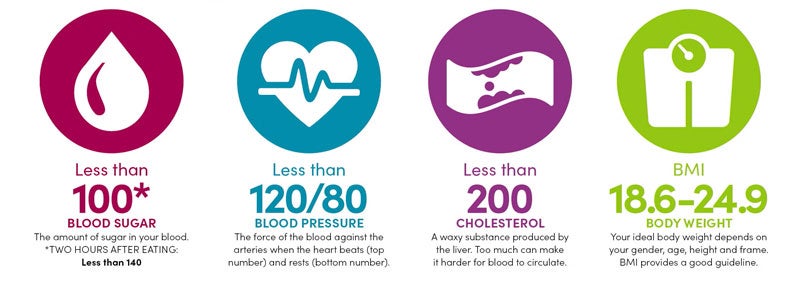
Heart disease is the number one cause of death in the United States. And as you get older, the chances for heart disease increase. Here are four numbers you should know to help understand your overall health and wellness.
Ideal blood pressure is less than 120/80
Blood pressure is the force of blood flowing through your blood vessels. A normal blood pressure level is important to keep blood moving throughout your body, but a high blood pressure means your heart is working too hard causing long-term damage.
Your blood pressure is determined by two numbers: systolic and diastolic pressure. The top number, systolic blood pressure, measures the force your heart pushes on your artery walls each time it beats. The bottom number, diastolic blood pressure, measures the force your heart pushes on your artery walls in between beats or in rest. Ideally, your blood pressure would be less than 120/80.
To help manage your blood pressure, it’s important to control your stress levels. Some useful coping strategies include:
- Taking a walk
- Practicing breathing exercises
- Getting plenty of sleep
- Limiting alcohol consumption and smoking
Find out your risk for heart disease
Blood sugar should be less than 100
Your blood sugar is an important number to know for diabetes management. Sugar is vital to create energy to fuel your brain, muscles and heart. Blood sugar can be checked with an A1C test that looks at your average blood sugar level over the past three months.
Your ideal blood sugar level should be less than 100 or less than 140 two hours after eating. Follow these six steps to manage your diabetes.
Find out your risk for type 2 diabetes
Keep your cholesterol under 200
A waxy substance produced by the liver; cholesterol is not inherently bad. Circulating through your blood, cholesterol is needed by your body to help build cells and create vitamins and hormones. Too much cholesterol causes buildup along the inner walls of your arteries and makes it more difficult for blood to flow throughout your body. An ideal cholesterol reading is less than 200.
A healthy BMI is 18.6-24.9
Body Mass Index (BMI) gives an approximate measurement of your body fat based on height and weight. BMI measurement is not the gold standard to determine your health. It is, however, a good guideline to start looking at your overall wellness. Your BMI is determined by your gender, age, height and frame. On average, a healthy BMI score is 18.6-24.9.
Tips to living a healthy life
Knowing how your body works is the first step in living a healthy life. Your overall wellness is greatly impacted by your lifestyle choices, which means small changes can create a big difference. Improving your wellness can be as easy as parking further back when you go to the grocery store, to a complete overhaul of your health. Here are some small changes you can make that will have an impact:
- Monitor the added sugar in your foods
- Move your body in a way you enjoy
- Quit smoking
- Limit alcohol consumption
- Don’t miss your yearly cancer screenings and wellness visits
- Take time for your mental health
- Practice healthy coping mechanisms when you’re stressed
These four numbers are a beginning step to understanding your overall health. Make an appointment with your provider today, or find one near you, to learn your numbers.
